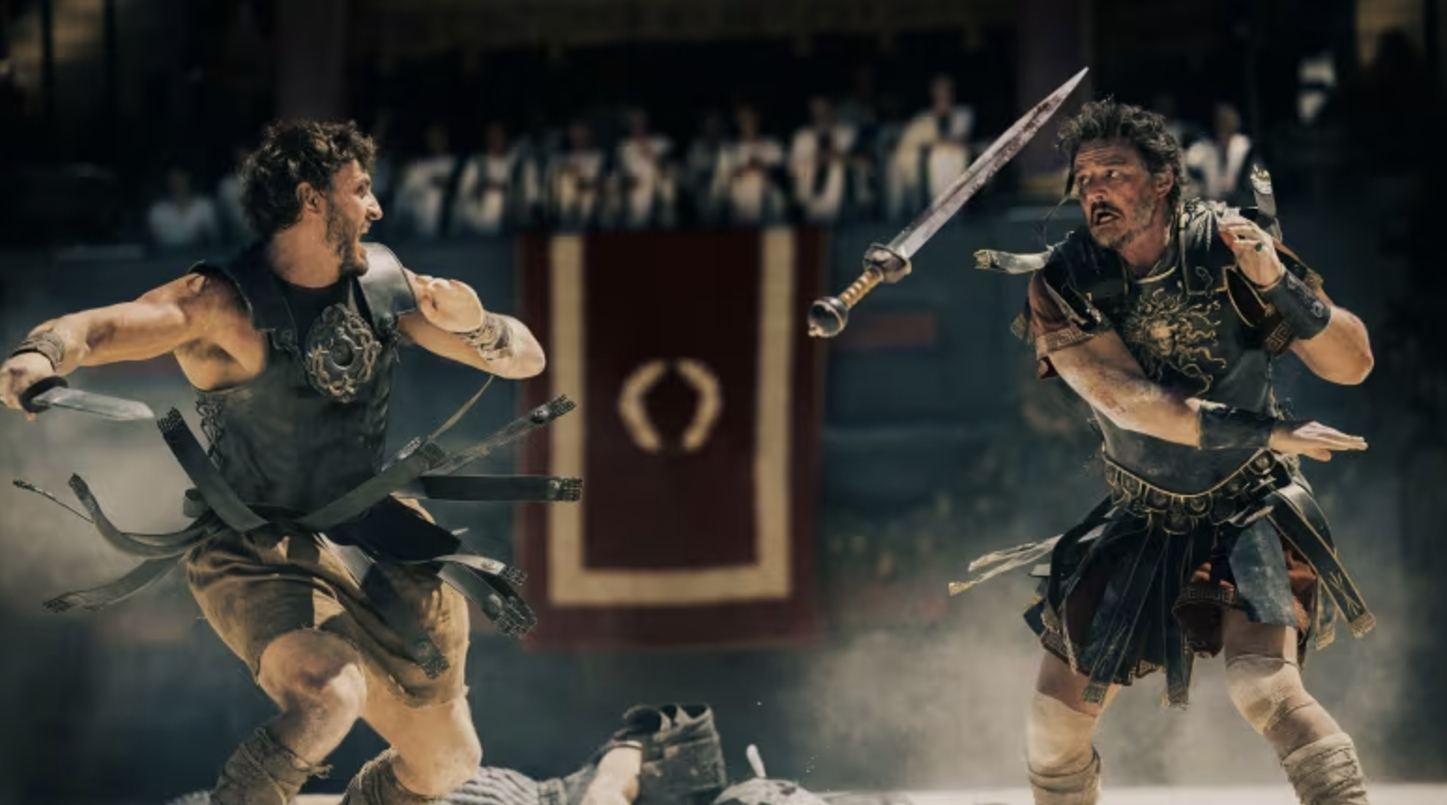Back to carnage in the Colosseum where the spirit of the original looms large
Alien. Blade Runner. Black Hawk Down: At his directorial best, few can compete with Ridley Scott. His filmmaking commands our attention and ratchets up the intensity, while taking us to a world we’ve never seen before.
In 2000, with a 35-year-old Russell Crowe and a studio worried about an audience with no appetite for a sword-and-sandals epic, Sir Ridley flung us into the Colosseum with the original Gladiator. If you haven’t seen the original in a while, its pace may surprise you.
Not so slow as it is patient, the film takes its time, establishing the bona fides of its characters. We’re introduced to Crowe as General Maximus on the field of battle, witnessing his leadership and strategic mind in action. Then come the tragic circumstances of his family’s fate, setting in motion an inevitable confrontation.
Crowe, with his fury-soaked baritone, was well cast. The result was an eminently quotable and watchable piece of entertainment. In a world where studios feast upon pre-existing IP like starving harpies, it’s no surprise Scott and Paramount Pictures elected to return to Rome for Gladiator II, out Friday.
Evil Emperors and the death of New Rome
Set 20 years after the death of Maximus, the dream of a new, more democratic Rome has been smothered by the capricious whims of the emperor twins, Caracalla and Geta (Fred Hechinger and Joseph Quinn).
Meanwhile, exiled for his own safety, Lucius, the son of the former emperor’s daughter Lucilla, has built a life of his own in Africa Nova. But the appetite of the emperors knows no limit. The alert is sounded. The Roman army, led by General Acacius (Pedro Pascal), lays siege. Defeated and distraught, Lucius becomes the property of Macrinus, a merchant who buys and sells gladiators, played by Denzel Washington.
Here, the die is cast: Paul Mescal as the new gladiator ascending, battling through his grief with increasing levels of viscera; Pascal as the all-too-virtuous general, waging a war for the soul of Rome. At his side is the return of Connie Nielsen as the general’s wife Lucilla, slowly realizing her connection to the barbarian the crowds are cheering for.
Sad eyes for a super-sized He-Man
As an actor, Mescal has demonstrated a knack for vulnerability in All of Us Strangers and Aftersun. Some of his best roles are his quietest, where we can imagine the complicated thoughts dancing behind his sad eyes. It’s strange, then, to see him super-sized into this heroic He-Man of a warrior, slicing and dicing nameless centurions.
Part of the problem is a story that doesn’t work to earn the audience’s trust, instead assuming it already has it. From the opening frames, Lucius is presented as an unstoppable warrior. But little is said about how the scrawny child we met in the first film becomes this fighting machine. When it comes to his abilities as a leader, the script does him few favours, with dialogue like, “This is about survival.… Survive.”
Instead of giving Mescal space to make the role his own, the shadow of his predecessor looms large, to the point where he isn’t just quoting Maximus — he’s channelling Crowe’s voice.
In the area of action, Gladiator II is a Roman orgy of excess. Killer baboons? Check. A soldier riding a battle-armoured rhino? Check. One impressive set piece features the gladiators pitted against Roman soldiers in a naval battle in shark-infested waters. Instead of this being a forum to appreciate Lucius’s leadership, Ridley Scott muddies the water with a barrage of quick edits, making it impossible to appreciate each ship’s location, and thereby Lucius’s strategy.
Dazzling Denzel
But there is one aspect that rings true, bringing purpose and, yes, entertainment to Gladiator II: Denzel Washington, at 69 years old, in a performance so nimble, flirtatious and downright devious you might begin to question for whom you should be cheering.
This is the power of an actor with experience, who knows his instrument intimately. The careful arching of the eyebrow. The pursed lips when something catches his interest. The probing eyes of a schemer. Washington weaponizes his magnetism, blinding his opponents with that megawatt smile.
While the narrative bounds Mescal to Maximus cosplay, Washington is freer to make Macrinus his own. Like a musician playing jazz, he’s open to the moment, punctuating dialogue with easy and effortless embellishments.
The success of the first Gladiator wasn’t expected, but under the blood and sand, it had something to say. When Maximus bellowed, “Are you not entertained?” he was calling out to the crowd of voyeurs, and the politicians who kept the audience distracted with bread and circuses.
Twenty-four years since the release of the original, things in real life haven’t changed so much. After a divisive U.S. election, millions tuned in to watch a glitch-prone boxing match, a battle between an aging legend and a social media star.
But Gladiator 2 isn’t interested in a larger message — it’s too busy worshipping at the altar of nostalgia. It’s a shallow spectacle, built on the bones of something better.
Source: cbc.ca


